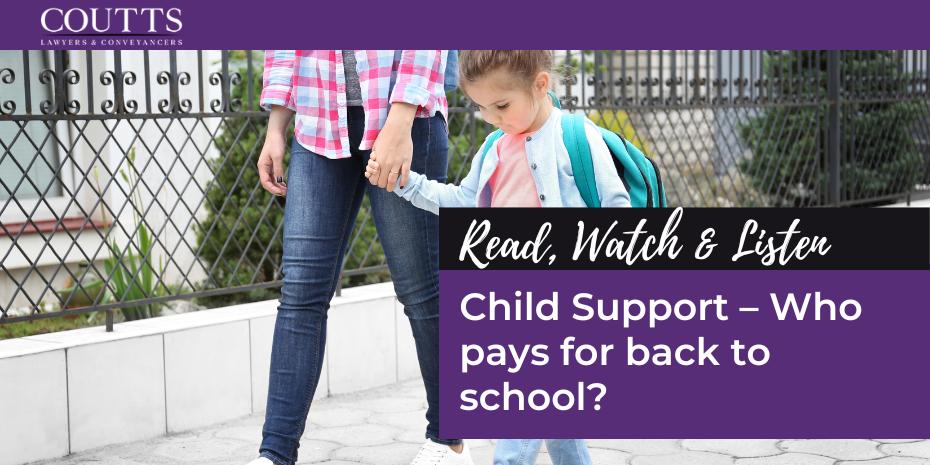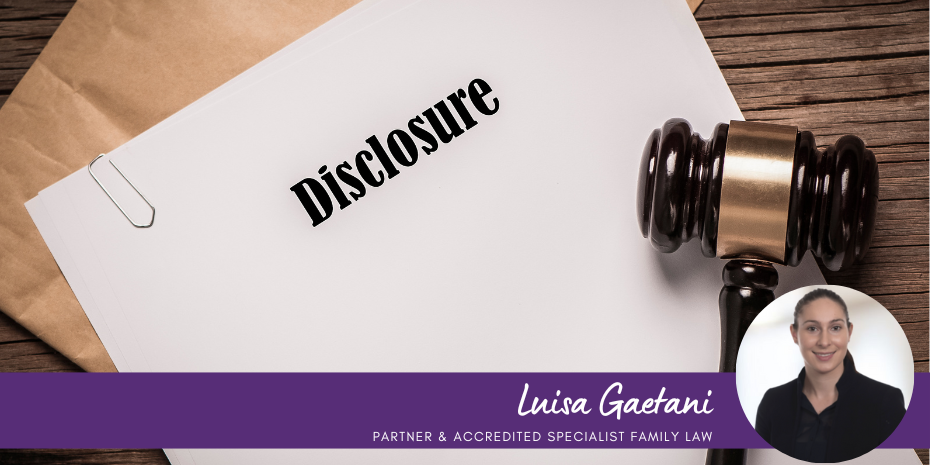KEY TAKE-OUTS:
- Child Support is designed to ensure that children receive a proper level of financial support from their parents.
- Parents are able to choose whether they would prefer to have the amount of Child Support assessed by the Child Support Agency, or alternatively they can come to their own private agreement.
- With back to school costs sky rocketing, who is liable to pay these expenses?
What is Child Support?
In Australia, Child Support is governed by the Child Support (Assessment) Act 1989 (Cth) (“the Act”), which notes that the object of the Act is to ensure that children receive a proper level of financial support from their parents. When parents have separated, in some instances, it is necessary for one parent to assist the other financially to ensure that the needs of the children are being met. This payment is called Child Support.
Who has to pay Child Support, and who can receive Child Support?
In assessing whether Child Support is payable, or whether you are eligible to receive Child Support, it is important to know each parent’s current income, and how often they look after child/ren. You will be liable to pay Child Support when your percentage of care of the child/ren is less than your share of the combined income. You will be eligible to receive Child Support when your percentage of care of the child/ren is more than your share of the combined income. For example, if you currently have care of the child/ren for 7 nights per fortnight and earn 25% of the combined income, you will be eligible to receive Child Support.
Are there options available?
Parents are able to choose whether to have their Child Support rights and obligations assessed through the Child Support Agency, or they can choose to come to their own private arrangement.
How much do I need to pay if I choose to go through the Child Support Agency?
If the parties choose to go through the Child Support Agency, they will determine the amount payable using a formula detailed in the Act. The formula takes into consideration the number of children, the age/s of the child/ren, the income of each parent and each parents’ share of the care of the child/ren.
Once the amount is determined by the Child Support Agency, the parties will then need to choose how the Child Support will be paid/received. Parents can choose to have the Child Support automatically collected by the Child Support Agency and transferred directly to the receiving parent, or they can choose private collection and arrange payment privately.
Do I also need to pay school fees, uniforms, school excursions, extra-curricular activities if our child support is assessed through the Child Support Agency?
Child Support as assessed by the Child Support Agency is designed to cover all aspects of the financial needs of the child/ren. Any school fees, uniforms, school excursions, extra-curricular activities are included in this payment. It is the responsibility of the parent receiving the payment to allocate the funds to the needs of the child/ren. The parent paying Child Support is not obliged to pay any further expenses in relation to the child/ren, although they may wish to do so.
What do I need to do if we decided on our own agreement?
If the parties choose to come to their own arrangement, it is open to them to agree on any amount they wish. Although there is no requirement that the arrangement be formalised, they do have the option of entering into a Binding Child Support Agreement or a Limited Child Support Agreement. Both Binding Child Support Agreements and Limited Child Support Agreements cover periodic and non-periodic payments. Periodic payments are regular payments of the same amount to cover the financial expenses involved in caring for the child/ren. For example, the agreement may be to pay $350 per week, which will be used to cover the day-to-day expenses such as food and clothing. Non-periodic payments relate to the payment of, or contribution towards, expenses such as school fees, school uniforms, extra-curricular activities, medical expenses and dental expenses.
What is the difference between a Binding Child Support Agreement and a Limited Child Support Agreement?
Parties entering into a Binding Child Support Agreement are required to obtain independent legal advice. The Binding Child Support Agreement contains a certificate stating that, in accordance with the Act, the parties have been provided independent legal advice in relation to the Agreement, which must also be signed by the Lawyer. The Binding Child Support Agreement will not be considered binding without these certificates. Unlike Limited Child Support Agreements, there is no requirement that the parties entering into a Binding Child Support Agreement complete a Child Support Assessment, or that the party receiving child support have at least 35% care of the Child/ren. There is also no restriction on the amount of Child Support payable, and the parties are at liberty to come to their own arrangement.
It is important to note that one of the limitations in entering into a Binding Child Support Agreement is that it will not take into consideration a change of circumstances in the future. For example, where one party remarries, or their income changes substantially, it is not open to amend the Binding Child Support Agreement to take these changes into account.
Limited Child Support Agreements do not require the parties to obtain independent legal advice and do not require the signature of a Lawyer. However, we recommend that parents seek independent legal advice, so they are aware of their rights and obligations in relation to Child Support before entering into an agreement. Before a Limited Child Support Agreement will be accepted by the Child Support Agency, the parties must have completed a Child Support Assessment. The amount payable in the Limited Child Support Agreement must be equal to, or more than, the amount contained in the Child Support Assessment. In addition, there is a requirement that the party receiving Child Support must have at least 35% care of the Child/ren.
Who receives the $150 government vouchers for back-to-school expenses?
The NSW government has made available to all NSW families with school-aged children, 3 x $50 vouchers, totalling $150, to be used at selected providers for back-to-school supplies. The vouchers, similar to the Active Kids and Creative Kids vouchers, can be used only with registered providers for a wide range of expenses, including school uniforms, school shoes, stationary, bags, technology requirements, textbooks – a list of eligible expenses can be found here.
In order to be eligible, the relevant child must be a resident of NSW and enrolled to attend school in 2023. To apply, the applicant must be the parent/guardian/carer of the child. Only one parent per child is eligible to apply and receive the vouchers.
What about separated parents – do we both receive the vouchers?
Only one parent per eligible child will receive the vouchers. In the case of separated parents, particularly where the care of the child is shared equally between both parents, it is up to the parents to decide between themselves who will receive the voucher. Once a parent makes an application in relation to a child, the other parent becomes ineligible to apply.
If the parent paying child support through the Child Support Agency receives the voucher, are they obligated to pay all the back-to-school expenses?
In short, technically no. As outlined above, child support payments are considered to be payment in full for any expenses relating to the child. While it is anticipated (and hoped) that separated parents who are co-parenting their children will be able to come to an agreement between themselves in relation to which parent applies for, and receives, the voucher, and in relation to which expenses (and which products) to pay with the voucher, this may not always be the case. There could be circumstances whereby the voucher is used on unnecessary or optional expenses not agreed by both parents, and the parent that did not receive the voucher thereafter liable for the remainder of the required school expenses. For example, Parent A and Parent B are the parents of Child X. Parent A pays to Parent B child support as assessed by the Child Support Agency. Parent A applies for and receives the vouchers in relation to Child X. Parent A then decides to use the full value of the vouchers towards an optional or unrequired school expense. Parent B is now solely responsible for all necessary school expenses (uniforms, shoes and stationery) which could have been purchased with the vouchers had they been the parent to make the application first.
How would this be different if I had a Binding Child Support Agreement?
Binding Child Support Agreements allow the parties to come to an agreement between themselves as to how the expenses relating to the child are to be shared. This includes a wide range of options, including one parent paying 100% of the expenses, or the expenses shared between the parties in any other arrangement (for example, 50% each, 75% Parent A/25% Parent B etc). Depending on the specific drafting of the agreement, usually one party is reimbursed by the other party upon provision of the receipt. That is, Parent A pays the expense, provides a copy of the receipt to Parent B who reimburses Parent A for their share of the expense in accordance with the terms of their Binding Child Support Agreement. If this was the case, and the vouchers were used to pay for back-to-school expenses by one party, the liability of the party to reimburse the other would be correspondingly reduced by the value of the voucher used, and therefore both parties would receive the benefit of the voucher.
If you have any questions about child support, or you are thinking about entering into a Binding Child Support Agreement it is imperative you obtain sound, independent legal advice from the team of experts at Coutts. Don’t hesitate to call us now at 1300 COUTTS to schedule a consultation.
For further information please don’t hesitate to contact:
info@couttslegal.com.au
1300 268 887
Contact Coutts today.
This blog is merely general and non-specific information on the subject matter and is not and should not be considered or relied on as legal advice. Coutts is not responsible for any cost, expense, loss or liability whatsoever to this blog, including all or any reliance on this blog or use or application of this blog by you.



